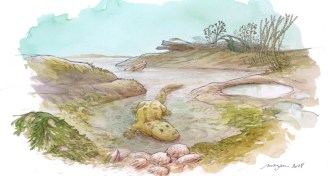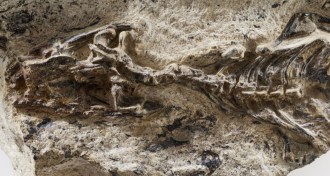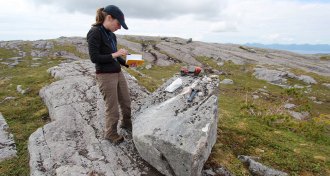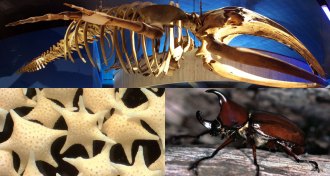All Stories
-
 Animals
AnimalsThe first land-walking vertebrates may have emerged from salty estuaries
Early tetrapods were transitional creatures — not only between land and water, but also between fresh and salty environments.
-
 Paleontology
PaleontologyOldest known lizard fossil pushes group’s origins back 75 million years
CT scan reveals hidden identity of an unusual lizard fossil found years ago in the Italian Alps.
By Susan Milius -
 Climate
ClimateThe first Americans could have taken a coastal route into the New World
Alaskan glaciers retreated in time for ancient coastal entries of the first Americans.
By Bruce Bower -
 Science & Society
Science & SocietyThe power of great editors, their lessons and legacy
Editor in Chief Nancy Shute reflects on the history and legacy of Science News editors.
By Nancy Shute -
 Health & Medicine
Health & MedicineFinally, a plan on how to include pregnant women in clinical trials
The FDA is providing initial guidance on how to include pregnant women in clinical trials that study drugs, research that has largely excluded this group in the past.
-
 Science & Society
Science & SocietyReaders respond to pesticides, Hawking radiation and more
Readers had questions about pesticides, Hawking radiation and the intersection of science and the public.
-
 Health & Medicine
Health & MedicineHurricane Maria killed at least 4,645 people in Puerto Rico, a study estimates
Researchers estimate Puerto Rico’s death toll from Hurricane Maria at more than 4,500 people based on household surveys — dwarfing the official count of 64.
-
 Astronomy
AstronomyAstronomers scrutinized last year’s eclipse. Here’s what they’ve learned
Astronomers observed the 2017 total solar eclipse from the ground and the air, and found some never-before-seen features of the sun’s atmosphere.
-
 Genetics
GeneticsThe history of heredity makes for a fascinating, and chilling, read
From eugenics to gene editing, Carl Zimmer’s She Has Her Mother’s Laugh recounts genetics’ biggest discoveries.
-
 Health & Medicine
Health & MedicineKeeping people within U.S. blood pressure guidelines saves lives
Big reductions in heart attacks, strokes and deaths may be possible under 2017 blood pressure guidelines.
-
 Particle Physics
Particle PhysicsDark matter particles elude scientists in the biggest search of its kind
The XENON1T experiment saw no signs of hypothetical dark matter particles called WIMPs.
-
 Life
LifeSkeletons come in many shapes and sizes
In Skeletons, two paleobiologists recount how and why skeletons evolved, as well as the variety of forms they take and the many purposes they serve.
By Sid Perkins